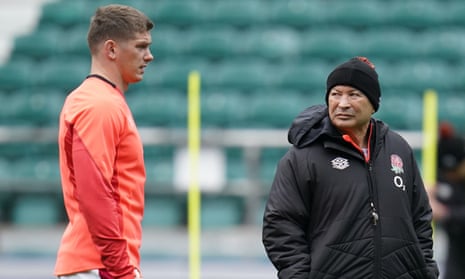It has been 10 years since Owen Farrell played his first Test for England, against Scotland at Murrayfield back at the start of the 2012 Six Nations. By the dog years in which rugby players measure their Test careers, that’s a lifetime or so ago. Ben Youngs is the only other player from that match who is still playing international rugby. Most of the rest moved on a long time ago, into second careers in or outside the sport. Farrell, 20, fresh faced and whippet thin, played at inside-centre that day. The Scottish fans booed him all game. It didn’t make any difference, he kicked eight points, and England won by seven.
If Eddie Jones’s plan works out, Farrell will be back there at Murrayfield in a fortnight’s time. It is, even by Jones’s standards, a particularly mulish bit of thinking. Farrell, who spent most of last year struggling to find his best form, hasn’t played a single minute of competitive rugby since he injured his ankle playing against Australia last autumn.
There are other regular players – Sam Underhill, Elliott Daly, Manu Tuilagi – who have been left out of the 36-man squad because they are still working their way back to match fitness after more recent injuries. But for Farrell, it doesn’t matter, he’s pencilled in, as captain, for the first game of the tournament.
Meanwhile another of Jones’s old favourites, George Ford, can’t get in the squad even though he was picked as Premiership player of the month once in October and then again in December.
The inconsistency is all the more conspicuous because England got on just fine without Farrell when they beat South Africa last autumn, with another survivor, Courtney Lawes, as captain, and a rearranged midfield of Marcus Smith, Tuilagi, (who was replaced by Joe Marchant after he went off injured), and Henry Slade, who played his best Test yet.
After that match, everyone was asking exactly how Farrell was going to slot into the team when he was fit again. A couple of months later, Jones’s answer suggests it was never a question at all. He wants Farrell outside Smith, a combination that looked a little hit and miss in the one Test they played against Australia.
“Every brilliant 10 in the history of the game has been accompanied by a stable 12, and that’s the combination I think we need to have,” Jones told the BBC, “and Owen brings that at 12, his reading of the game, his ability to take pressure off of Marcus is going to be so important, Dan Carter was always at his best when he had Aaron Mauger at 12, Stephen Larkham was at his best when he had Rod Kafer at 12, he couldn’t run out of sight on a dark night, but he read the game, and did all the organisation for him, and freed the 10 up to play the game.”
But with Farrell, it’s never just about what he does on the pitch. So much of what makes him a great player, so many of his best qualities, are hidden from public view. It’s one reason why those who have played with him are often so much quicker to talk him up than some of England’s fans, who sometimes seem, even now, oddly indifferent to him after all these years.

It’s in the way he carries himself around the squad, the rigorous and punishing dedication to the job, and the exacting standards he sets for himself and expects of everyone else. In all that, he sounds a lot like Jones himself.
Neither of them loses a lot of time worrying about what anyone else thinks. But you get the sense there has been more debate about Farrell’s role, and in particular his captaincy, in these last few months than Jones has ever let on in public. Given that Jones has been rebuilding the team and has put particular emphasis on redeveloping their leadership group, it would be odd if he and the other coaches hadn’t been talking about it behind the scenes.
In his recent book, Leadership, Jones describes Farrell as a “developing” captain, even though he has already led England in 34 Tests and, if he carries on with the job this year, will have done it more often than anyone except for Will Carling. In the book, Jones talks about how Farrell’s “aggressive and belligerent” style of play gets in the way when he’s “trying to forge a positive relationship with a tricky referee”. He backed away from that when I asked him about it in an interview last December: “I don’t think there’s a captain that doesn’t need to improve, John Eales, Sean Fitzpatrick, they were heavily criticised in their first years.”
But it’s clear he wants him to work on his man management. Jones has had to do that too. He has said that he identifies with Farrell. “I like the guys that have come up the tougher way, who maybe don’t fit the stereotype, who have got to keep battling, have got to keep proving themselves, because they’re the loyal players, they’re doing it because they want to be good, not for someone else,” he told me.
And of course they also remind him of himself. And as he says, he has had to learn “that when you grow up in a tough environment those softer skills aren’t so appreciated, so you don’t tend to develop them, it’s something that only comes later in your life, when you realise you have got to do that.”
Jones clearly has an affinity with Farrell. But by picking him as captain again now, you wonder if he has pushed it a little too far.

